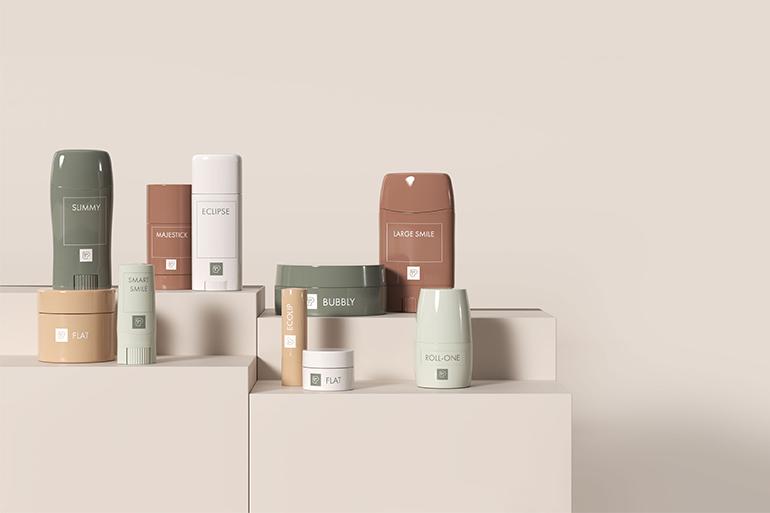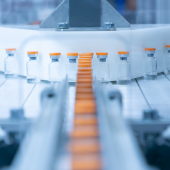Encoding beauty: the view of ... Induplast
Created out of the synergy of Induplast, Verve, Vexel and Petroplast, Induplast Packaging Group offers the cosmetics industry a wide range of standard and full custom packaging.

In the last decade it has invested energy and resources in designing solutions with limited environmental impact, such as 100% recyclable mono-material packaging, stick packaging, trays in recycled plastic (PCR) and refillable containers, with maximum attention to sustainable themes. The sustainability practiced by the group is Ecocert Cosmos certified, attesting the conformity of the product and the packaging to the strict regulatory protocol relating to natural and organic cosmetics. Induplast, therefore, has the market approach and credentials to make it an ideal participant as protagonist in the Cosmopack 2023 Factory Project dedicated to traceability with the “Encoding Beauty” claim.

ItaliaImballaggio met Rosalba Rotella, sales director of Induplast Group, who starts from a series of observations linked to the cosmetics product around which the Factory 2023 concept revolves, and to the most suitable choice of packaging.
«It’s an emulsion that should not have any contact with the outside world, whether this regards the air or manipulation on the part of the consumer», Rotella begins.
«This is why the choice of packaging was an airless container which, besides preventing contamination while preserving the quality of the product, makes it possible to reduce the need for using preservatives, thanks to the level of protection offered. A perfect solution for natural formulations, the airless container reduces waste thanks to the precision of the dosing device and a dispenser that guarantees total consumption of the product, without leaving residues. In practice, it corresponds perfectly to the style and requirements of N&B Natural is Better, which produces the raw material and emulsion and which we have worked closely with to develop the “Encoding Beauty” project as suppliers of the packaging». She continues: «The new aspect of the airless container that we have proposed lies in its being “refillable”. It’s, therefore, a packaging optimised for reuse, with the refills (obviously of the same product! Ed.) offering an unusual plus factor, since our airless container preserves and keeps the formula intact also with multiple refills».
Constant dialogue between product and packaging
The conversation steered then towards Induplast’s specific role in the Encoding Beauty project, which enhances the synergy between the partners involved.
«Induplast’s airless container - Rotella continues - is the fruit of research over 3 years by our Innovation Committee, with the task of designing the best “sustainability” solution focusing on a functional container for the most demanding cosmetics industry. It’s worth pointing out that the Committee is composed of 3 R&D managers, of former owners guaranteeing an entrepreneurial approach, and of technicians that engineer the project, subsequently developed in our internal workshop: this is a normal process for us, which distinguishes us and of which we are genuinely proud. We always involve experts in filling techniques, who carry out tests and share their expertise on the effectiveness and functioning of the solution in terms of machinability.
The next step is to use packaging solutions that embrace sustainability from various points of view: on the industrial side, with containers which are manageable and standard-compliant; on the consumer side, a packaging that reduces waste to a minimum and is easily recyclable. Specifically for the airless container, the joint research allowed us to find a truly sustainable solution, thanks to the mono-material used for the ferrule, cap and body of the container; there is nothing here, therefore, to do with “greenwashing. With regards to the Factory, N&B adapted the texture of the emulsion in order to find a point of synthesis between formula and packaging, so as to develop a product that is ready to be launched on the market».

Anti-counterfeiting: an anti-greenwashing resource
The question of combatting counterfeiting stands out amongst the objectives of the Encoding Beauty project, with the aim of safeguarding both consumer and brand, in which track and trace plays a strategic role, decisive also at the packaging level.
«Induplast marks all the packaging that leaves the factory - Rotella goes on – with the objective of guaranteeing traceability, “unmasking” in this way counterfeit products, which can generate problems of sealing, conservation and functionality. We are able to control our supply chain, from the specifications of the material declared by our suppliers, to the design and processing, to ensure that a guaranteed product leaves our factory. For example, we have to avoid the risk of defining as mono-material (in which Induplast is a leader, in particular with stick packets, Ed.) a product which cannot be correctly disposed as such. A way to trace the composition of every single element of the packaging certainly gives us a significant advantage over unfair competitors. We should not forget, moreover, the final consumer, who knows what material we are effectively using without undermining their responsible purchasing choice. We can imagine a future of QR codes, including environmental labelling, which is often difficult to manage due to lack of space on certain types of packaging».
Track & trace for quality
The adoption of vision systems by the cosmetics industry is improving quality standards, approaching concepts currently applied to the pharmaceutical market and including every element of the production chain, including that of the packaging.
«Traceability in the cosmetics sector is fundamental – the manager underlines, - but it is also important to know if the packaging is produced with controlled recycled material originating from a certified supply chain. There are too few certifying bodies, and in a period of a shortage in raw materials, we have the clear perception of how much non-certified material is allowed to circulate, jeopardizing machinability and stability tests. A badly preserved cosmetic as a result of unsuitable or non-certified packaging implies significant risks, particularly in skincare or in the pharmaceutical channel, in which incompatibility between product and packaging can affect effectiveness and healthiness. A rushed or accelerated test with respect to established times often leads to this type of problem (whereas the most rigorous producers often take up to 6 months), with even paradoxical proofs. To test the sealing of a decoration, for example, some pharma customers subject our containers to a temperature that exceed 80 degrees: this a is a condition that the packaging will never have to endure in practice, but is necessary to ensure maximum quality from every aspect. Whoever avoids carrying out these tests, which Induplast assigns to customers, risks having problems of compatibility of the product with the packaging, with damage to the brand image and to the intrinsic quality of the product itself».

Eco design and LCA analysis
Packaging has, therefore, become an indispensable element to ensure the sustainability of an entire supply chain, a consideration about which Rotella continues:
«All customers ask us today for sustainability, in which the product is a “green choice” that the packaging respects thanks to rigorous tests of compatibility. For some materials, such as rPET, compatibility is guaranteed, while PCR does not correspond to the food grade that the cosmetics industry, instead, requires. We have responded to this problem with co-extruded bottles, produced with a layer of 25% of virgin material in contact with the product and 75%of recycled material. The concept of sustainability is central for us and must be openly and clearly expressed: if we refer to a mono-material, that’s what it must be; if it’s rPET, we know the supply chain; if it’s PCR and co-extruded, it is us who produce it. Our R&D team is at the constant search for new materials, identifying solutions and looking for improvements where possible, which include use of the right material in the most appropriate context. A transparent rPET, as Italian ones generally are, is perfect also for a cosmetic that has precise requirements, while other recycled materials, with coloration or unsuitable aspects, can easily be directed to other uses».
At the end of our long conversation, Rotella points out the importance of certifications, which take the concepts of sustainability into the realm of what is measurable, verifiable and comparable, guaranteeing authentic green solutions and not simple greenwashing operations.
«Induplast carries out LCA analysis on its own packaging», she concludes. «Given that we produce everything internally, every aspect is traced and measured. Customers know that our standards are the result of a measurable and real comparison, with a life-cycle assessment that makes it possible to access at any time all the data provided on the packaging. In conclusion, in our opinion, LCA and mono-materials are the two main alternatives of a truly sustainable choice, especially if combined with the possibility of educating the consumer to dispose in a correct way: these are key factors of the green transition in progress».





















